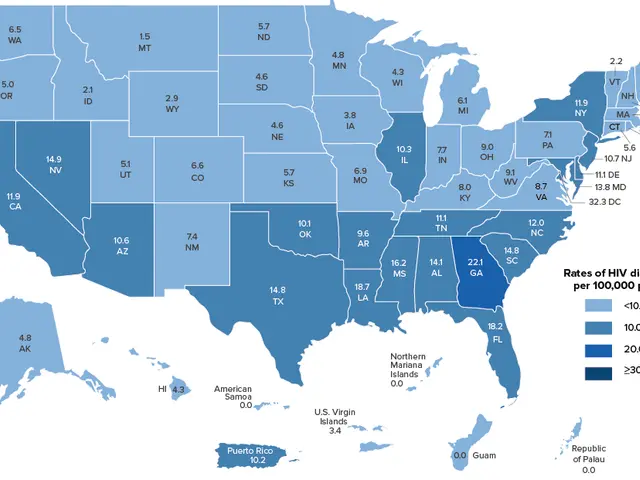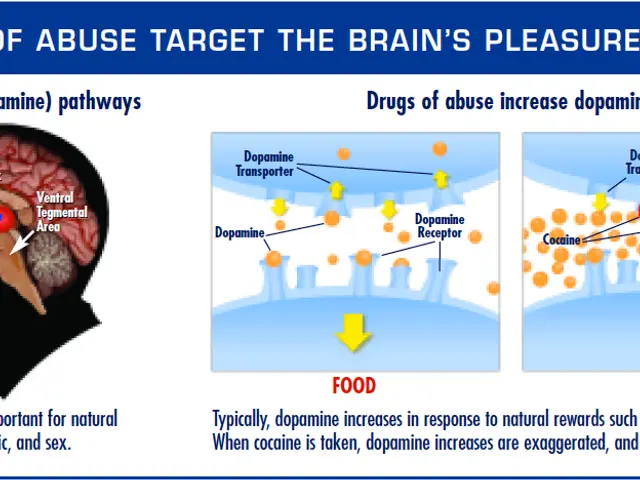Duration of Caffeine in the Body: Insights into Metabolism and Other Factors
In the world of stimulants, caffeine is a popular choice for many, found in everyday beverages such as coffee, tea, and energy drinks, as well as in foods like chocolate and some protein bars. However, understanding the impact of caffeine on our bodies is crucial, especially for sensitive individuals and those in specific health conditions.
Regular caffeine consumption by nursing women has little or no consequences on sleep patterns of babies and children aged over 3 months. Yet, small amounts of caffeine can be transferred through breast milk, so it's essential for nursing mothers to limit their intake before feedings.
For adults, most can safely consume 200-300 mg of caffeine per day, with exceeding this amount potentially leading to sleep issues. Caffeine has a half-life of about 5 hours, meaning it can take roughly 15 to 30 hours for caffeine to be fully cleared from the body, depending on individual biology and lifestyle factors.
The duration that caffeine's effects last varies significantly among individuals. Factors such as genetics, smoking status, pregnancy, hormonal factors, liver function, body composition, diet, caffeine dose, and tolerance all play a role in determining how long caffeine stays in the body. For instance, smokers often clear caffeine faster due to nicotine's influence on metabolism. On the other hand, pregnancy and impaired liver function can slow down caffeine metabolism.
Caffeine is absorbed quickly—about 99% within 45 minutes—but its effects can last from about 3 to 6 hours on average, with some people feeling residual effects for up to 12 hours or more depending on sensitivity and metabolism.
It's essential to note that excessive consumption of caffeine can mask underlying sleep disorders. If someone suspects that their caffeine intake is causing sleepless nights, they should lower their consumption until they determine the right limit. Anyone who regularly has trouble sleeping or waking up should discuss underlying sleep disorders with a doctor.
Caffeine can also be found in drugs and over-the-counter medicines, including Excedrin. Symptoms of caffeine withdrawal include general fatigue, crankiness or irritability, muscle pain, nausea or an upset stomach, a lack of focus, headaches or migraines. These symptoms may resolve when a person consumes caffeine again.
To avoid these symptoms, rather than quitting caffeine abruptly, it may be better to gradually reduce intake until it can be eliminated without symptoms. People will quickly realize when they have had too much caffeine. Be aware of the following symptoms: nervousness, stomachache, diarrhea, rapid or irregular heartbeat, increased rate of breathing, insomnia, feeling fidgety or restless, sweating, irritability, anxiety attacks.
In conclusion, while most people clear caffeine within roughly 12 to 24 hours, the metabolic rate can range quite broadly from as quickly as 1.5 hours to as long as 12 hours or more for the half-life, depending on individual biology and lifestyle factors. It's always recommended to be mindful of caffeine consumption and its effects on your body.
- For some individuals with sensitive health conditions, such as bipolar disorder or certain sleep disorders, even small amounts of caffeine found in coffee or energy drinks could potentially exacerbate symptoms.
- In the realm of health-and-wellness, understanding the predictive effects of caffeine on mental health is crucial, given its potential impacts on anxiety, depression, and sleep patterns.
- Nutritionists emphasize that CBD, a non-psychoactive compound found in cannabis, could interact with caffeine and potentially mitigate some of its negative effects on anxiety and sleep.
- For nursing mothers, excessive caffeine consumption could lead to problems like eczema and psoriasis in babies, even though caffeine transfer through breastmilk is usually minimal.
- Fitness enthusiasts should be aware that caffeine, being a stimulant, can elevate heart rate during workouts and may, in some cases, affect post-workout recovery.
- Caffeine is not just found in beverages like coffee, but is also present in medications like Excedrin, both of which can have profound effects on overall well-being, especially when consumed excessively.
- Consistent with the science behind health-and-fitness, a balanced lifestyle that includes a nutritional diet, exercise, good sleep hygiene, and mental health awareness can help mitigate the potential negative effects of caffeine on the body.







